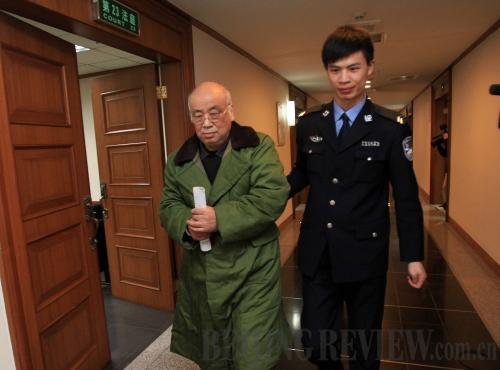|
 |
|
Author Adel Sabry |
In February 2007, when I visited China as a member of an Egyptian delegation, I was surprised to find that Chinese people could talk about corruption so openly. I had gotten the impression from Western media that China always avoided touching on the topic. On the contrary, Chinese President Hu Jintao and Premier Wen Jiabao have made anti-corruption one of their top priorities and the Chinese media regularly report on instances of corruption.
I came to China again in May, as the country was under scrutiny from Western media. Both Time and The Economist had recently run cover stories about China's corruption problems. After arriving in Beijing, I found that not only did government officials express their opinions on corruption openly, but they also disclosed details of corruption cases.
 |
|
BROUGHT TO JUSTICE: Wang Jiping, former Director of the Beijing Local Taxation Bureau, stands trial for the charge of embezzling more than 10.47 million yuan ($1.66 million) and taking bribes totaling 4.35 million yuan ($690,476) on November 28, 2011 (CFP) |
The Chinese Government has relentlessly pursued anti-corruption efforts. President Hu stressed in one of his speeches in July that the Communist Party of China (CPC) should govern itself more strictly and take measures to crack down on the problem. Premier Wen said in his article Let Power Run in the Sun, published in April in Qiushi (Seeking Truth) magazine, a theoretical journal of the CPC, that a government should serve the people, be pragmatic and honest. He required governmental officials at different levels to be supervised by the whole society and to respect and protect citizens' and organizations' rights of supervision. "The government at each level should respond to the questions raised by the public and the media immediately by investigating problems and solving them in accordance with the law," he said in the article.
In 2007, the National Bureau of Corruption Prevention (NBCP) was established to tackle the problem of corruption. The media have long paid close attention to corruption and have revealed major cases. The data from the NBCP show that from 1982 to 2011, a total of 4.2 million governmental and Party officials were punished for corruption, among whom 465 were officials at ministerial and provincial levels. According to Cui Hairong, Deputy Director of the NBCP, between 2003 and 2011, more than 42,000 officials were transferred to the judicial organs on charges of corruption, including Chen Liangyu, a former member of the Political Bureau of the CPC Central Committee.
I once talked about the problem of corruption with the vice mayor of Shanghai during a visit. He said that in 2010 the disciplinary inspection and supervision departments nationwide handled 139,621 cases of embezzlement and bribery, wound up 139,482 cases and punished 146,517 officials, retrieving 8.97 billion yuan ($1.42 billion). In his view, corruption exists in every country, and it is important to punish corrupt officials strictly because of its negative impact on society and the economy. He also called on countries around the world to unite in fighting against corruption. According to him, China has so far signed anti-corruption cooperation pacts with more than 80 countries and regions.
"China has fought against corruption continuously for the last 20 years. Especially since the 16th National Congress of the CPC, the Party has taken more effective measures in cracking down on corruption," said Li Xueqin, head of the research division under the CPC Central Commission for Discipline Inspection (CCDI), in an interview with the Xinhua News Agency.
From 2002 to 2012, the Central Government of China has made remarkable progress in tackling problems that people are concerned about, such as the use of public funds for overseas trips, overspending on official vehicles, and excessive ceremonies and forums.
|
